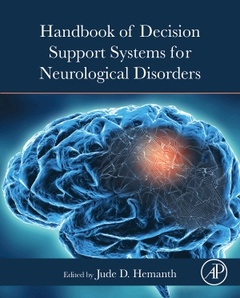Handbook of Decision Support Systems for Neurological Disorders
Coordonnateur : Hemanth D. Jude

2. Brain tissue segmentation to detect schizophrenia in gray matter using MR images
3. Detection of small tumors of the brain using medical imaging
4. Fuzzy logic-based hybrid knowledge systems for the detection and diagnosis of childhood autism
5. Artificial intelligence for risk prediction of Alzheimer’s disease: a new promise for community health screening in the
older aged
6. Cost-effective assistive device for motor neuron disease
7. EEG signal-based human emotion detection using an artificial neural network
8. Multiview decision tree-based segmentation of tumors in MR brain medical images
9. Multiclass SVM coupled with optimization techniques for
segmentation and classification of medical images
10. Brain tissues segmentation in magnetic resonance imaging for the diagnosis of brain disorders using a convolutional neural network
11. Fine motor skills and cognitive development using virtual reality-based games in children
12. A CAD software application as a decision support system for ischemic stroke detection in the posterior fossa
13. Optimization-based multilevel threshold image segmentation for identifying ischemic stroke lesion in brain MR images
14. A study of machine learning algorithms used for detecting cognitive disorders associated with dyslexia
15. A Critical Analysis and Review of Assistive Technology: Advancements, Laws, and Impact on Improving the Rehabilitation of Dysarthric Patients
16. A comparative study on the application of machine learning
algorithms for neurodegenerative disease prediction
Dr. Hemanth received his B.E degree in ECE from Bharathiar University in 2002, M.E degree in communication systems from Anna University in 2006 and Ph.D. from Karunya University in 2013. He has published 37 edited books with reputed publishers such as Elsevier, Springer and IET. His research areas include Computational Intelligence and Image processing. He has authored more than 200 research papers in reputed SCIE indexed International Journals and Scopus indexed International Conferences.
- Includes applications of computer intelligence and decision support systems for the diagnosis and analysis of a variety of neurological disorders
- Presents in-depth, technical coverage of computer-aided systems for tumor image classification, Alzheimer’s disease detection, dementia detection using deep belief neural networks, and morphological approaches for stroke detection
- Covers disease diagnosis for cerebral palsy using auto-encoder approaches, contrast enhancement for performance enhanced diagnosis systems, autism detection using fuzzy logic systems, and autism detection using generative adversarial networks
- Written by engineers to help engineers, computer scientists, researchers and clinicians understand the technology and applications of decision support systems for neurological disorders
Date de parution : 04-2021
Ouvrage de 320 p.
19x23.3 cm
Thèmes de Handbook of Decision Support Systems for Neurological... :
Mots-clés :
Alternative communication devices; Alzheimer's disease; Alzheimer's disease; Alzhemier's disease; Anisotropic diffusion filter; ANN; Artificial intelligence; Assistive device; Assistive technology; Augmentative communication devices; Autism spectrum disorder; Brain imaging; Brain metastases; Brain tissues; CAD system; Cancer detection; Cancerous tumors; Cheek movement; Classification; Clustering; Cognitive development; Cognitive disorders; Community; Computed tomography (CT)Decision support system; Convolutional neural network; Convolutional neural networks; Data processing; DEAP dataset; Decision tree; Deep learning; Dementia; Disabilities; Display; Dysarthria; Dyslexia; EEG; Electroencephalogram (EEG) signals; Electromagnetism-like optimization; Emotion recognition; Emotional intelligence; Feature-based methods; Fine motor skills; Fuzzy cognitive maps (FCM)Fuzzy logic systems; Genetic algorithm; Harmony search; Image segmentation; Image similarity indices; Ischemic stroke detection; Ischemic stroke; Leap Motion Controller; Machine learning; Medical image processing; Metaheuristic Markov random field segmentation; Mild cognitive impairment; Motor neuron disease; MR imaging; MRI; Multiview decision tree; Neuroimaging; Neurological disorders; Particle swarm optimization; Posterior fossa; Predictive analysis; Psychiatric disorder; Public health; Rehabilitation therapy; Rehabilitation; Rician noise; Screening; Segmentation; Sensor; Serious games; Simulated annealing; Skull stripping; Software technology; Speech impaired; Speech therapy; Stroke diagnosis; Support vector machine; Unity3D; Virtual reality



